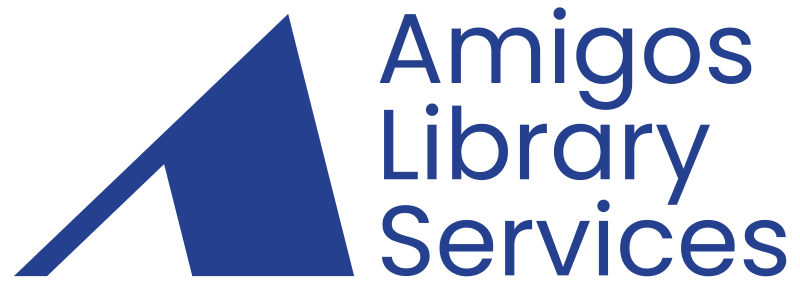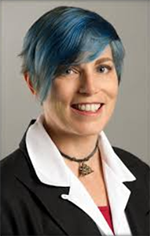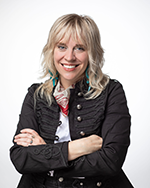 Follow @lindsonmars
Follow @lindsonmars
Keynote Speaker: Lindsay Cronk - University of Rochester - lindsay.cronk@gmail.com
Session Time: 10:00 - 11:00 a.m. CST
Session Title: What Moves Us: Approaching Migration, Managing Change
Session Description: Did we jump or were we pushed? Are we pivoting or reacting? Are we moving forward or are we being forced to move? Exploring the tensions of migration in an increasingly constrained marketplace and economy, this keynote address will identify and explore the forces driving big moves in library collections and workers. Acknowledging the cultural and economic connections between and drivers in common of both the marketplaces of library technologies and library employment, this talk will highlight opportunities for change management and celebration of the often hidden labor at the center of library work that makes migrations possible.
Speaker Bio: Lindsay Cronk is the loudest librarian in most rooms and serves as president-elect of the Core: Leadership, Infrastructure, Futures, the newest division of the American Library Association. She currently works as Head of Collection Strategies and Scholarly Communication at the University of Rochester, and prior to that she worked at the University of Houston and LYRASIS. She's seen her fair share of migrations - professional and personal - from Indiana to Georgia to China to France to Texas and finally to New York where her library recently moved from Voyager to Alma. Cronk's research has focused on the scholarly publishing marketplace, which is the topic of her recurring column in the Serials Librarian, Resourcefully.
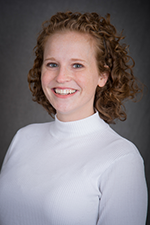 Follow @heidivix
Follow @heidivix
Speaker: Heidi Vix - Webster University - heidivix29@webster.edu
Session Time: 11:15 - 12:00 p.m. CST
Keynote Session Title: Moving Mountains: Incorporating New Catalogs Into Your Own
Session Description: As a worldwide institution, Webster University has libraries in several countries. In the past two years, Heidi has migrated the Athens campus library into Webster's own and set up a new catalog in Tashkent, Uzbekistan. In the next year, she will begin migrating the Thailand campus library into the library's own Innovative Interfaces Sierra ILS.
Speaker Bio: Heidi Vix has a Master of Library Science with a specialization in technology management from Indiana University at Indianapolis. She has over 10 years' experience as an electronic resources librarian and is currently the Head of Resources Management Services at Webster University. She enjoys spending time with her family in her ever-expanding garden.
 Follow @matthewragucci
Follow @matthewragucci
Speaker: Matthew Ragucci - Wiley University - mragucci@wiley.com
Speaker: Athena Hoeppner - University of Central Florida - athena@ucf.edu
Speaker: Xiaoyan Song - North Carolina State University - xsong9@ncsu.edu
Session Time: 11:15 - 12:00 p.m. CST
Session Title: Oh the Places You'll Go: Improving the Content Platform Migration Experience
Session Description: Online content has become the norm in modern libraries, with a large percentage of our collection hosted on vendor-controlled web-based content platforms. Content platforms provide tools for searching, viewing and interacting with content, and may provide a variety of additional functionality. Vendors continuously strive to improve their platforms and periodically transition from one platform to another. While new platforms can improve user experience, expand and hone functionality, and increase security, the migrations involve a lot of work and can be disruptive, affecting end-users, librarians, publishers and service vendors.
Despite the tedious preparation by publishers, vendors and librarians, content platform migrations are rarely seamless. Due to the complexities involved, a problem-free migration is the exception rather than the norm. The NISO Content Platform Migration Working Group was formed to address these challenges and aims to establish recommended practices and checklists to standardize and improve platform migration processes for all stakeholders involved with online content platforms.
Speaker Bio: Matthew Ragucci is the Associate Director of Product Marketing and Wiley's resident librarian. He provides insight on metadata sharing strategies for optimizing its electronic resources for discovery, access and usage. This includes working closely with librarians and library solutions providers alike to get the tools they need to help the end user. With interests are cataloging, metadata, data standards, and user experience, Matthew also moonlights as a reference and instruction librarian.
Speaker Bio: Athena Hoeppner is the Electronic Resources Librarian at the University of Central Florida. She has 25 years of department-spanning experience in academic libraries. She began in reference and instruction where she indulged a love for public services, then moved to library systems to explore a fascination with computers and technology. Athena now resides in acquisitions where she coordinates eResources acquisitions and maintains systems that enhance discovery and access. Athena’s work and research center on applying technology to connect users to content. Her projects explore usability, user interfaces and technology for improving discovery of, and access to, information.
Speaker Bio: Xiaoyan Song is the Electronic Resource Librarian (ERL) at the Monograph Unit in the Acquisition and Discovery (A&D) department at NCSU Libraries. She mingles with all aspects of ebooks including acquisition, license negotiation, activation, ebook troubleshooting and workflow mapping. She holds an Master of Library Science from Simmons College, an master’s in color science from Rochester Institute of Technology and a bachelor’s in information management from Shandong University.
Speaker: Scott Brandwein - SWAN Library Services - scott@swanlibraries.net
Speaker: Samantha Dietel - SWAN Library Services - samantha@swanlibraries.net
Session Time: 11:15 - 12:00 p.m. CST
Session Title: Frontloading the Work of Data Migration
Session Description: In the past 5 years the SWAN (System Wide Automated Network) consortium has grown from 78 members to 100. They have migrated standalone libraries and other consortia from a diverse range of ILS systems. During this process, SWAN has focused on profiling and mapping as well as MARC analysis to minimize duplication of bibliographic records.
This session will examine the process from planning to post-migration cleanup and will look at practical solutions for maintaining existing required policies within new standard configurations of the consortium. This includes circulation and hold maps, item types and categories, and patron profiles and permissions. The consortium has made the decision to not load electronic resources, which are instead accessible through the OPAC via automated harvest. This requires cleanup of electronic resource records in the catalog before setting up those connections.
SWAN has also devised a method of matching incoming bibliographic records to its existing catalog, sidestepping the need for a labor intensive deduplication process. This also minimizes required post-migration bibliographic cleanup. OCLC holdings are maintained by the consortium, so this process requires a reclamation.
Speaker Bio: Scott Brandwein is the Bibliographic Services Manager with SWAN and has overseen migration of 23 libraries. He specializes in MARC data and has developed a bibliographic matching algorithm for pre-deduplication. Scott led the development of an open source solution for maintaining consortial holdings on OCLC.
Speaker Bio: Samantha Dietel is a Bibliographic Services Consultant with SWAN specializing in system configuration and policy profiling.
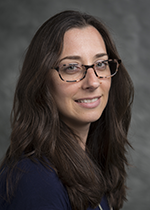
Speaker: Ann Kardos - University of Massachusetts Amherst - annk@umass.edu
Session Time: 12:15 - 1:00 p.m. CST
Session Title: Track & Accept Changes: Welcoming Your Next ILS Implementation
Session Description: Large projects, such as ILS implementations, are particularly complicated. They involve numerous stakeholders and take months or even years to accomplish. Exploring the path through a migration and implementation at the start of a project can help you anticipate what is next. Managing and accepting change also helps a team coalesce and face daunting projects without fear! Throughout their career, Ann has been a part of four ILS implementations and, in this presentation, will share tips on the kinds of work that can be expected during the different stages of an implementation, discuss approaches to change management and identify a variety tools to help everyone along the way.
Using the example of the on-going Five Colleges FOLIO implementation as a case study, Ann will provide attendees with tactics that have worked (as well as some that haven't), while also drawing on her previous experiences with systems and database migrations at other institutions.
Speaker Bio: Ann Kardos (she/her pronouns) is a metadata librarian at University of Massachusetts Amherst. She is the lead of the Five Colleges Inventory Working Group, where she and her team map data, collect use cases, and participate in FOLIO community bug testing and special interest groups. She has a wide cataloging and metadata background, having experience with a variety of resource types from gum wrappers to data sets. She loves solving creative metadata puzzles and supporting positive change in technical services. Ann has been a part of four different ILS implementations. She makes many mistakes and learns something new every time. You can reach her at annk@umass.edu.
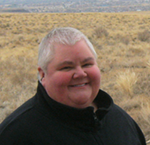 Follow @awinter505
Follow @awinter505
Speaker: Amy Winter - University of New Mexico - amywinter@unm.edu
Session Time: 12:15 - 1:00 p.m. CST
Session Title: Repository Migrations
Session Description: Get an inside view of content and metadata migrations between popular repository systems: DSpace, Open Journal Systems, ArchivesSpace, CONTENTdm, Omeka, and Digital Commons.
Speaker Bio: Amy Winter holds a master's degree in public administration from the University of Pittsburgh. Her experience is in web development and data and records management. She currently works as a program specialist in the Digital Initiatives and Scholarly Communication program at UNM University Libraries, where she manages many digital projects. Amy's research interests include feminist and women's history, which inform her work on the ongoing digital humanities project "And Yet She Persisted: Women at UNM and Across New Mexico."
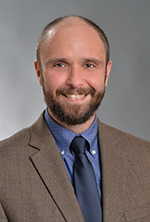 Follow @thinkpol
Follow @thinkpol
Speaker: Bill Helman - Townson University - whelman@towson.edu
Session Time: 12:15 - 1:00 p.m. CST
Session Title: Digital Accessibility and the ILS Migration
Session Description: Considering an Integrated Library System (ILS) migration can be one of the largest, and most fraught, projects a library can undergo; and this is only multiplied when that migration is on behalf of a consortium of libraries. Of all the moving parts, competing requirements and desired features, digital accessibility may be easy to overlook. After all, most people understand the importance of digital accessibility for our front-end users, at the catalog or discovery layer levels, but find it easy to prioritize our own staff needs much lower in this area.
In this session we will explore the importance of supporting an equitable, diverse, and inclusive environment for library staff, by prioritizing digital accessibility concerns in the ILS request for proposal (RPF) process. Centered on the current efforts at the University System of Maryland and Affiliated Institutions (USMAI) to prepare for a system migration, the presentation will highlight effective strategies for communicating with vendors and consortia partners in order to foster a shared culture of responsibility around digital accessibility. The session will also open a discussion related to the need for a standardized accessibility rubric that individual libraries and consortia can use to evaluate the accessibility of ILS's.
Speaker Bio: Bill Helman is the information technology librarian at Towson University. He received his master's in library and information science from Simmons University, and a master's in information systems from UMBC. Professionally he is interested in user centered technology, digital accessibility and labor issues in libraries. Unprofessionally he is interested in baking and D&D. He is also a chicken herder, a former beekeeper, and father to two precocious adventurers.
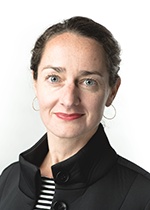
Speaker: Amy Hezel - Regis University - ahezel@regis.edu
Session Time: 2:00 - 2:45 p.m. CST
Session Title: Escaping the Silos: A Collaborative Approach to Evaluating and Implementing Library Technology
Session Description: Decisions related to library technologies such as ILSs, LSPs and discovery tools are often made at the top and handed down to the department responsible for the administration of these tools. Yet, evaluating and making decisions about ILSs and discovery tools impacts everyone in the library! A systems librarian will share how she made the case for a collaborative, cross-departmental approach for evaluating the current ILS, investigating, alternate options and implementing new products. She will share how the new approach helped to shed boundaries between departments and put the power of the decision-making in the hands of the staff.
Speaker Bio: Amy is a Discovery & Systems Librarian and Associate Professor at Regis University. She has worked in several cities and at different types of libraries, including museum, digital archive, public and academic libraries in New York, Iowa, California, and Colorado. Amy has also worked in the private sector as a systems librarian and customer relations manager.

Speaker: Rebecca French - James Madison University - frenchrb@jmu.edu
Session Time: 2:00 - 2:45 p.m. CST
Session Title: Metadata Analysis for Pre-Migration Cleanup
Session Description: When faced with a library system migration, it can be daunting to know where to begin with data cleanup. In many cases, there is a long list of tasks to tackle before switching to a new system and not enough time to perform them all. Therefore, it is important to target your efforts to the most impactful areas. In this presentation, Rebecca will provide guidance on deciding where to focus your available time for metadata cleanup. She will present metadata assessment criteria that will help you know what to be looking for in your data that could potentially cause issues during a migration. Finally, she will share analysis techniques and examples to show how to look for those issues in your metadata, drawing on her experience performing this work for her library's recent migration.
Speaker Bio: Rebecca B. French (she/her) is the Metadata Analyst Librarian at James Madison University, where she recently participated in JMU Libraries' migration to Alma and Primo VE. She develops workflows and tools for efficiently creating, manipulating, transforming and analyzing metadata at scale. Her work spans traditional MARC cataloging, e-resource batch loading, and metadata for archival and digital collections. Rebecca was previously a music cataloger at James Madison University and at Indiana University's William and Gayle Cook Music Library. She earned a bachelor's from The College of William and Mary and a Master's of Library Science with a specialization in music librarianship from Indiana University.
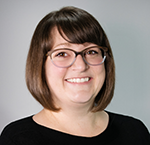 Follow @pat2pattern
Follow @pat2pattern
Speaker: Charissa Brammer - Colorado College - cbrammer@coloradocollege.edu
Speaker: Cate Guenther - Colorado College - cguenther@coloradocollege.edu
Session Time: 2:00 - 2:45 p.m. CST
Session Title: Migrating to an Open-Source ILS in an Academic Library
Session Description: Open source integrated library systems are becoming increasingly popular with academic institutions, a trend that is expected to continue as these systems, including Koha and Folio, mature and become widely available. Their popularity is partially attributable to the increasing costs of proprietary systems and the growing availability of affordable third-party support for those libraries that don’t have the staffing or funding to fully support an open source system. For libraries that are considering migrating to an open source product, we present two examples: the University of Montevallo, which moved from Horizon to Koha in 2018, and Colorado College, which moved from Millennium to Koha in 2020. 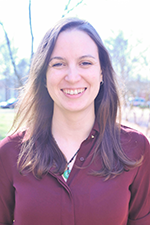 In this session, the presenters will discuss the preparation of data for migration, the design of the OPAC and the patron experience, the implementation of supported Koha, the process of working with staff and faculty on a major migration, and, of course, communication. By describing the ways in which this process differs across public and private institutions, this session will help librarians to understand the process of migration, the many ways in which migrations can go right, and some ideas of what to do when something inevitably goes wrong.
In this session, the presenters will discuss the preparation of data for migration, the design of the OPAC and the patron experience, the implementation of supported Koha, the process of working with staff and faculty on a major migration, and, of course, communication. By describing the ways in which this process differs across public and private institutions, this session will help librarians to understand the process of migration, the many ways in which migrations can go right, and some ideas of what to do when something inevitably goes wrong.
Speaker Bio: Charissa Brammer is the Metadata and Discovery Systems Librarian for Colorado College. She is primarily interested in the ways in which systems in libraries can help our users to locate and make use of the information that they need, with a special focus on inclusivity, accessibility, user experience, and data- and people-informed system architecture and design.
Speaker Bio: Cate Guenther is the Digital Scholarship and Repository Librarian for Colorado College. She spends her time learning and helping teach others about copyright, digital publishing and access for digital materials. Cate is an advocate for open licensing and open access publishing.
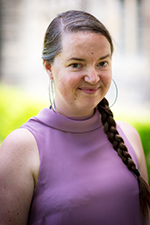 Follow @susancbond
Follow @susancbond
Speaker: Susan Bond - Robarts Library, University of Toronto - susan.bond@utoronto.edu
Session Time: 3:00 - 3:45 p.m. CST
Session Title: Let them See your Process: Engaging and Including Staff in an LSP Migration
Session Description: When the University of Toronto began its migration to a new LSP after 18 years with its previous ILS, they knew they had to keep our staff apprised of and excited about the transition. In a library system that has a central system, federated partners, a hospital consortium, and over 400 staff across more than 40 libraries, we needed a comprehensive strategy for both technical communications and change management. With an overall strategy grounded in Brown and Levinson (1987)'s theory of "positive politeness", we undertook a three-pronged approach to reaching our diverse and distributed staff users. This session will provide an overview of our communications strategy, examine what worked and what didn't (and why), show how we dealt with Covid and other interruptions, and demonstrate how thoughtful communications and change management around a single project can help improve communications and change management in the rest of the institution.
Speaker Bio: A recent librarian (MI 2019), Susan also has fifteen years of experience as a library technician working in circulation. In her role as the Migration Coordinator, she not only deals with communications and change management around the LSP migration, but also coordinates the staff training and is configuring the fulfillment area of the new LSP. This is her first data migration. Other scholarly pursuits include a publication about the recent Jem and the Holograms comic, and she also works as a production dramaturg. In addition to her MI, she also has an MA and a BA (hons) in English and Linguistics, all from the University of Toronto.
Speaker: Sandy Hayes - Texas A&M University - Commerce Library - sandy.hayes@tamuc.edu
Speaker: Sean Anderson - Texas A&M University - Commerce Library - sean.andersen@tamuc.edu
Speaker: Ashlie Hight - Texas A&M University - Commerce Library - ashlie.hight@tamuc.edu
Session Time: 3:00 - 3:45 p.m. CST
Session Title: Bold Collaboration: How We Changed Everything in Less Than a Year
Session Description: In the spring of 2019, Texas A&M University-Commerce began preparations for pre-migration data cleanup in anticipation of launching a new integrated library system. As a committee, we identified "trouble" records and metadata points and quickly worked together to overhaul the catalog. Transferring data from Innovative's Sierra to Ex Libris's Alma began during the summer and we "went live" in December. Together, three of us - two faculty librarians and one staff member - became certified as administrators and set out to learn all the ins and outs of the system. During this relatively short amount of time, we learned a lot about how to work together as a team and make bold decisions. For our presentation, we will discuss how we accomplished tasks from project management to on-going post-migration cleanup, while working completely unbound from previous workflows and unsiloed from our ideas of strict departmental lines.
Speaker Bio: Sandy Hayes is the Head of Resource Acquisition and Discovery and has worked at Texas A&M University-Commerce for fifteen years.
Speaker Bio: Sean Anderson is the Systems and Discovery Librarian and has worked at TAMUC for eighteen years in a variety of positions.
Speaker Bio: Ashlie Hight is the Cataloging Associate at TAMUC and is expected to graduate with her library degree in May 2022.
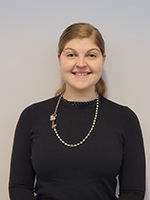
Speaker: Lauren Geiger - Mississippi State University Libraries - lgeiger@library.msstate.edu
Session Time: 3:00 - 3:45 p.m. CST
Session Title: Utilizing Documentation to Plan For Migrations
Session Description: Migrating materials from one system to another is, inherently, a disruptive process. From learning how to navigate a new system, to ensuring that all objects and their metadata are imported correctly (or at least with minimal issues), staff workflow is anything but normal. Patrons do not have access to these materials for a period of time, and they also have to learn a new system. Creating and maintaining access to materials is a major part of any library's, archive's or museum's purpose. Minimizing the disruption should be a priority among all involved. One way to do this is to assume that a migration will happen and start planning for it. By reviewing your organization's migratable systems long before a migration occurs, you can feel more in control once the process starts.
Documentation about the migratable system, especially its technical aspects, can help in preparing for a migration. Updating or creating documentation for your digital workflow can make data clean up and management of the materials easier during the process itself. Documentation is crucial for ensuring preservation, access and discoverability for your materials. The process for creating a documentation can be short or lengthy, depending the system itself, national and local standards your organization follows or wishes to follow, the stakeholders involved, resources held, and the time allotted for projects. Documentation at its core should explain how to do something, whether it's how to standardize a metadata element or process a specific collection, but it can be expanded into a roadmap for future needs.
In this presentation, attendees will learn how to create robust documentation that will be able to help navigate some of the processes of a migration. From gaining input from all your stakeholders to reviewing item accessibility and discoverability, Lauren will share what steps worked for her institution in creating better documentation and how it can be adapted to meet your needs. A migration is a large process but doing small things now can help make it seem less of a looming beast and more a manageable task.
Speaker Bio: Lauren Geiger is the Metadata Librarian at Mitchell Memorial Library at Mississippi State University. Her work focuses on metadata standardization, documentation, and data enhancement. She obtained her Master of Library of Science from the University of North Carolina at Chapel Hill in 2019.
